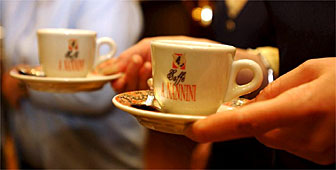No grounds for GM coffee, Swiss retailers agree

Non-governmental organisations have welcomed a widespread consensus among Swiss retailers not to import a new genetically modified coffee.
Swissaid and the Bern Declaration, presenting the results of a seven-month campaign, said some of Switzerland’s biggest coffee importers – Coop, Migros, Mövenpick, Merkur and Starbucks – shared their concerns about the GM coffee and would not stock it.
But this is no storm in a coffee cup. The two Swiss NGOs say the livelihoods of millions of poor farmers in the developing world are at stake.
Big threat
“Genetically modified crops don’t only have environmental implications. They can also have an impact on the daily lives of thousands of coffee farmers,” says François Meienberg of the Bern Declaration. “This GM coffee represents a big threat to poor coffee-producing countries like Colombia and Ethiopia.”
Their action, which followed a similar campaign by the British development organisation ActionAid, targeted one product in particular, developed by Integrated Coffee Technologies Inc. (ICTI), a Hawaii-based biotechnology firm.
This plant has been engineered so that its natural ripening process has effectively been switched off. The berries only ripen when “reactivated” by a chemical spray. This would make large-scale mechanical harvesting possible.
Labour intensive
Currently, harvesting coffee is a labour intensive exercise. Each berry ripens at a different time and has to be picked by hand. Because of this 70 per cent of all coffee is grown on small farms.
The ICTI innovation threatens to force millions of poor farmers in the developing world out of business and even further into poverty, as they see their only source of income taken away by market forces, the NGOs say.
“We already have a terrible crisis in the coffee market. The price has collapsed and most small farmers can’t meet their costs any more,” says Bruno Riesen, Swissaid’s executive secretary and president of the May Havelaar Foundation.
“The aim of this GM coffee is to cut the costs, increase production and reduce the price even more. Many producers may have no choice but to leave their farms and migrate to the slums in the big cities,” he told swissinfo.
Strong signal
The response from the big retailers has been encouraging. The biggest retail chains, Migros and Coop, have backed the campaign, as have coffee shop chains Mövenpick, Merkur and Starbucks. All have stated clearly that they will not sell the ICTI coffee.
“It’s a very strong signal to the industry that is working on new seeds that not everything that is possible is good,” Riesen says.
The ICTI coffee is not yet on the market, and Swissaid and the Bern Declaration would like it to stay that way. They say consumer power could mean that there is never a place in the Swiss market for such products.
“We hope this message will show to developers and the investors that there is no market for this ripening-controlled coffee,” Meienberg says. He adds that he would like to see the retailers adopt a code of conduct that would anticipate the social and environmental implications of new developments.
Coop spokesman Jörg Birnstiel said he did not believe there was any public demand for GM coffee, and that, in any case, the chain had strict guidelines about not stocking GM products if they had social, environmental or ethical implications.
The Swiss headquarters of Starbucks, meanwhile, told swissinfo that it was strongly behind the Swissaid/Bern Declaration initiative, and that it did not intend to stock GM coffee.
Fair trade
In parallel with their campaign, the NGOs have been encouraging people to buy coffee produced by fair trade labels, such as Max Havelaar, which support small producers and allow them to improve their standard of living in a sustainable way.
Swissaid and the Bern Declaration are also calling on major retailers to stock at least one fair trade brand. This is already the case in Migros and Coop, while Merkur says it is about to start stocking Max Havelaar coffee. Starbucks is also in discussions with the fair trade organisation.
The NGOs are not being complacent, however. Despite the strong support from most large retailers, others have remained silent.
Both the low-cost grocery chain, Denner, and Passaggio, the bistro chain which provides the catering for the Swiss Federal Railways, refused to answer letters and e-mails sent by the two aid organisations and by customers.
Meienberg also says that restaurants have been much slower than the supermarket chains in introducing fair trade coffee. With the likes of Merkur, Mövenpick and Starbucks backing the campaign, that may be about to change.
by Roy Probert

In compliance with the JTI standards
More: SWI swissinfo.ch certified by the Journalism Trust Initiative
You can find an overview of ongoing debates with our journalists here . Please join us!
If you want to start a conversation about a topic raised in this article or want to report factual errors, email us at english@swissinfo.ch.